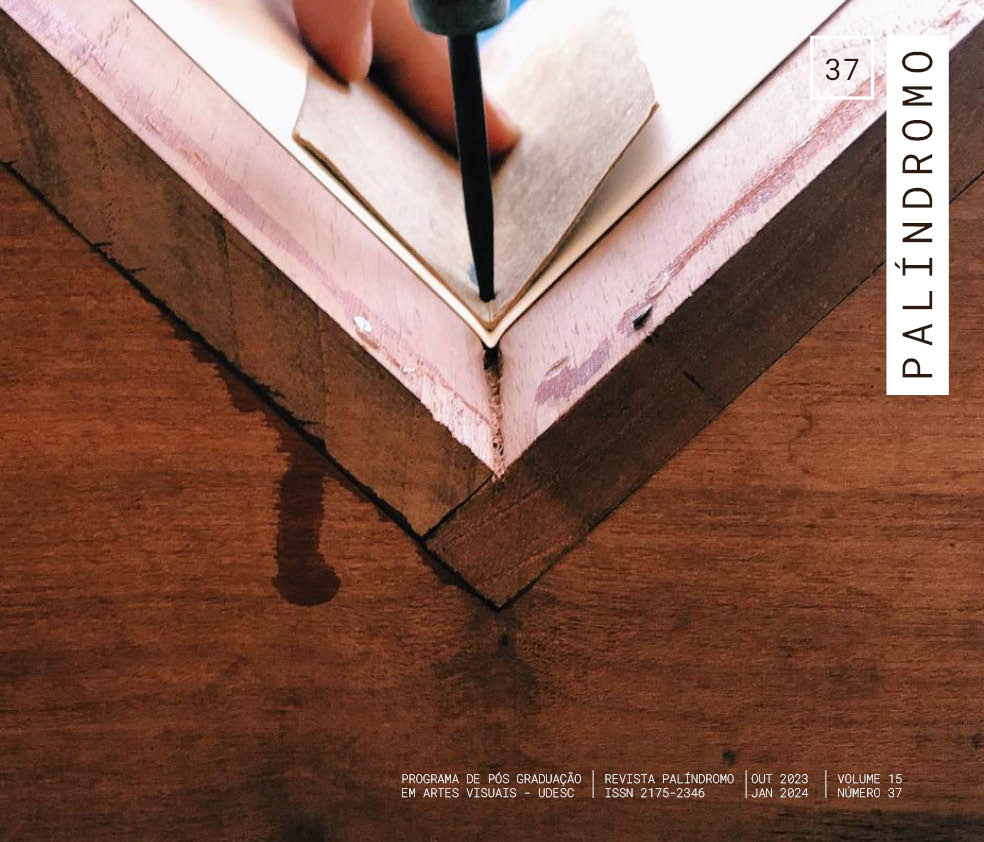Entrevistas-passo: um livro de artista em deslocamentos pela cidade
DOI:
https://doi.org/10.5965/2175234615372023e0013Palavras-chave:
entrevistas ambulantes, etnografia, educação, arte, transdisciplinaridadeResumo
Este artigo revisita o método das entrevistas-passo, que deu origem ao livro de artista Cidade Passo, anos depois de sua publicação, propondo uma releitura que desloca o trabalho de sua aproximação inicial com a etnografia em direção à noção de educação da atenção. No desenvolver desta análise, relaciono as entrevistas-passo com a imagem das "figuras de barbante" (string figures) proposta por Haraway para pensar sistemas colaborativos entre seres vivos e com a noção de percurso a pé enquanto desenho e objeto arquitetônico, a partir das reflexões de Jacques e Careri. Por fim, reescrevo uma das experiências feitas no contexto de produção do livro em São Paulo e proponho um diálogo desta como um novo trajeto, feito em 2020, em Salvador, lançando mão um modo de uma escritura em primeira pessoa que se identifica com a noção de “escrita acadêmica f(r)iccional”.
Downloads
Referências
ALMEIDA, Sónia Vespeira. Antropologia e práticas artísticas em Portugal. Cadernos de Antropologia, v. 1, p. 73-83, 2013.
HARAWAY, Donna. Staying with the trouble. Making Kin in the Chthulucene. Duke University Press. Durham and London, 2016.
INGOLD, Tim. Antropologia e/ como educação. Petrópolis, RJ: Vozes, 2020.
INGOLD, Tim. Chega de etnografia! A educação da atenção como propósito da antropologia. Educação, v. 39, n. 3, p. 404-411, 22 dez. 2016.
INGOLD, Tim. Lines. A brief history. Routledge: New York, 2007.HARAWAY, Donna.
LYRA, Luciana de Fatima Rocha Pereira. Escrita acadêmica performática... Escrita F(r)iccional: Pureza e perigo. Urdimento, Florianópolis, v. 2, n. 38, ago./set. 2020.
CARERI, Francesco. Walkscapes. O caminhar como prática estética. São Paulo: Editora G. Gili, 2013.
JACQUES, P.B. Elogio aos Errantes. Salvador: EDUFBA, 2012.
MOREIRA, Vânia Medeiros. Cidade passo: conversações entre arte, design e etnografia. 2017. Dissertação (Mestrado em Design e Arquitetura) - Faculdade de Arquitetura e Urbanismo, Universidade de São Paulo, São Paulo, 2017. doi:10.11606/D.16.2018.tde-09062017-104457. Acesso em: 2020-10-20.
EVANS, James; JONES, Phill. The walking interview: Methodology, mobility and place. In Applied Geography, n. 31, p. 849 - 858, 2011.
FOSTER, Hal. O retorno do real: A vanguarda no final do século XX. São Paulo: Ubu Editora, 2017.
SANTOS, Milton. A natureza do espaço: técnica e tempo, razão e emoção. São Paulo: Editora da Universidade de São Paulo, 2009.
Downloads
Publicado
Como Citar
Edição
Seção
Licença
Copyright (c) 2023 Vânia Medeiros Moreira

Este trabalho está licenciado sob uma licença Creative Commons Attribution 4.0 International License.
DECLARAÇÃO DE DIREITOS AUTORAIS
a. Os artigos publicados pela revista são de uso gratuito, destinados a aplicações acadêmicas e não comerciais. Todos os direitos autorais são atribuídos à revista. Os artigos cujos autores são identificados representam a expressão do ponto de vista de seus autores e não a posição oficial da Revista Palíndromo. O (s) autor (es) compromete-se sempre que publicar material referente ao artigo publicado no Palíndromo mencionar esta publicação da seguinte forma:
Este artigo foi publicado originalmente pela revista Palíndromo em seu volume (coloque o volume), número (coloque o número) no ano de (coloque o ano) e pode ser acessado em: http://www.revistas.udesc.br/index.php/palindromo
b. Plágio, em todas as suas formas, constitui um comportamento antiético de publicação e é inaceitável. A revista Palíndromo utiliza o software iThenticate de controle de similaridade


